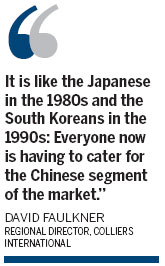Economy
Checking in, in Chinese
By Andrew Moody (China Daily)
Updated: 2010-10-25 11:02
 |
Large Medium Small |
|
 |
|
Tourists from China chatting in front of a duty-free shop in the Akihabara district in Tokyo. Japan has this year relaxed visa regulations for Chinese travelers to help boost the nation's tourism industry, which seeks to ease its reliance on a shrinking domestic population. [Photo/Agencies] |
BEIJING - Chinese tourists checking into a hotel in San Francisco, Frankfurt or London may soon not have to experience any language hassle at all.
They will be welcomed and allocated to their room by a fluent Mandarin-speaking check-in desk assistant.
The only thing that will seem strange about this is that the assistant won't be in the actual hotel itself but in a remote operations center that may be in Shanghai or anywhere else in China.
This is one of the technologies the international hotel industry is looking at implementing to cope with the expected boom in Chinese tourists over the next few years.
According to figures by the United Nations World Tourism Organization, China has the fastest growing international tourism market in the world.
The Chinese spent $43.7 billion on international tourism in 2009, a 21 percent increase on what they spent in 2005.
At this rate of growth they could soon topple Germany, the United States and the United Kingdom, the only countries who currently spend more.
Chinese guests
Kevin Murphy, president and chief executive officer of Asiawide Hospitality Solutions, which provides research on the hotels industry, is set to address the International Hotel, Motel and Restaurant Show in New York on the rise of the Chinese tourist later next month.
He said how to deal with increasing numbers of Chinese guests was on the top of the agenda of many international hotel chains.
"Technology is likely to be a possible solution. If we have 130 million Chinese traveling overseas in the next 15 years, we are not necessarily going to have 130 million Mandarin speakers to face them at their destination," he said.
"A check-in machine could link them with someone who does speak the language but they could be in Shanghai or anywhere else."
Murphy said this was only a modest evolution from the multi-lingual capability of many property management systems, which control the services available in many hotel rooms today.
"Property management systems increasingly have that capability. The hotel industry is starting to think of a range of options right now in anticipation of these sort of numbers happening," he said.
"Future Chinese tourists won't have it as hard as what tourists from other countries had 25 years ago. Then a hotel owner might have gone to the wife of the only Japanese person they knew in town to translate the guest compendium. This approach often led to elementary mistakes."
David Faulkner, a specialist in hotels and regional director of Colliers International, the international real estate organization based in Hong Kong, said what was happening now was similar to waves of tourists from other countries over the past 30 years.
Bigger effect
"It is like the Japanese in the 1980s and the South Koreans in the 1990s: Everyone now is having to cater for the Chinese segment of the market," he said.
He said the Chinese were having a bigger effect on the market because they had different preferences to tourists from other countries and those in the travel industry had to adjust to this.
"There is no point in getting excited about everyone wanting to go and lie on a beach in Thailand because it isn't going to happen.
"The Chinese don't see the point of sunbathing. Their travel habits are different to most people's. They like shopping, theme parks and, of course, eating."
Although the number of outbound trips by China tourists is set to increase from 52 million this year to 100 million in 2020, these figures are dwarfed by the number of domestic trips the Chinese take.

According to the National Bureau of Statistics, they are set to increase from 2.15 billion now to 3 billion in 10 years.
Brett Butcher, chief executive officer of Langham Hotels International, said both the international and domestic numbers were "staggering" and would have a dramatic effect on the hotel industry.
The Hong Kong-based operator has 10 properties operational or under development in China and in August opened a Langham Place at Beijing Capital Airport.
"I predict China will account for about half our business and become the biggest part of our business eventually. China remains the major engine of growth for the rest of the world. Its numbers remain impressive whichever way you cut them."
He added one of the big stories of the travel industry over the next decade will be Chinese tourists traveling abroad, especially those in northern China escaping to the sun in winter.
"Over time, say the next decade, we will see the rise of China and India as global powerhouses of the travel industry as their populations become more sophisticated travelers. We see the 'New Silk Road' of China, through to India and the Middle East as the backbone of our expansion," he added.
Murphy, who is also chairman of the hospitality committee of the Pacific Asia Travel Association (PATA), said a lot of Chinese still prefer to go abroad on Chinese-organized package tours.
Big surprise
"I was quite surprised about five years ago when I was staying near the Eiffel Tower in Paris. There were a couple of smallish hotels around the corner that had been bought by a Chinese travel corporation," he said.
"The people who stayed there got picked up by a Chinese tour company-owned bus with a Chinese guide and they even went to a Chinese restaurant owned by the inbound operator. It was classic Chinese vertical integration," he said.
He said a large number will still just want to go to places like Hainan, the Chinese tropical island in the South China Sea which has seen massive hotel investment in recent years.
"I think if I was northern Chinese and wanted a place in the sun I would go to Hainan because it is easy to get to and doesn't involve getting a visa," he said.
Faulkner added despite the huge rise in tourism numbers it was still a relatively small proportion of Chinese who travel.
"A fair proportion of people can't even afford a bus ticket to the next town and never go on a holiday. They are probably not going to be in the market for some considerable time," he added.



